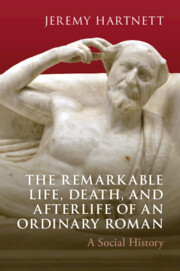Book contents
- The Remarkable Life, Death, and Afterlife of an Ordinary Roman
- The Remarkable Life, Death, and Afterlife of an Ordinary Roman
- Copyright page
- Contents
- Illustrations
- Acknowledgments
- Introduction
- Part I The Life and Death of Flavius Agricola
- Part II The Many Afterlives of Flavius Agricola
- Notes
- References
- Index
Introduction
Published online by Cambridge University Press: 16 December 2024
- The Remarkable Life, Death, and Afterlife of an Ordinary Roman
- The Remarkable Life, Death, and Afterlife of an Ordinary Roman
- Copyright page
- Contents
- Illustrations
- Acknowledgments
- Introduction
- Part I The Life and Death of Flavius Agricola
- Part II The Many Afterlives of Flavius Agricola
- Notes
- References
- Index
Summary
In 1626, workers took aim at four spots marked on the floor of the largest church in Christendom, Saint Peter’s Basilica in Rome. The structure’s immense dome hovered more than four hundred feet above them, for they stood at the intersection of the church’s nave and transept. They began to dig. These shafts, when eventually filled with masonry, would support a towering bronze tent (called a baldacchino) over the high altar. As shovels and picks hacked deep, the excavation took laborers back through layers of history. After breaking through the floor of the Renaissance church, they burrowed through the fill separating it from its fourth-century predecessor. They then cracked through that building’s pavement and struck an ancient cemetery (Fig. I.1). If authorities expected to find anyone’s remains, they were those of Peter himself or one of his papal successors, for they believed the key apostle and later popes were buried here.
- Type
- Chapter
- Information
- The Remarkable Life, Death, and Afterlife of an Ordinary RomanA Social History, pp. 1 - 6Publisher: Cambridge University PressPrint publication year: 2025

